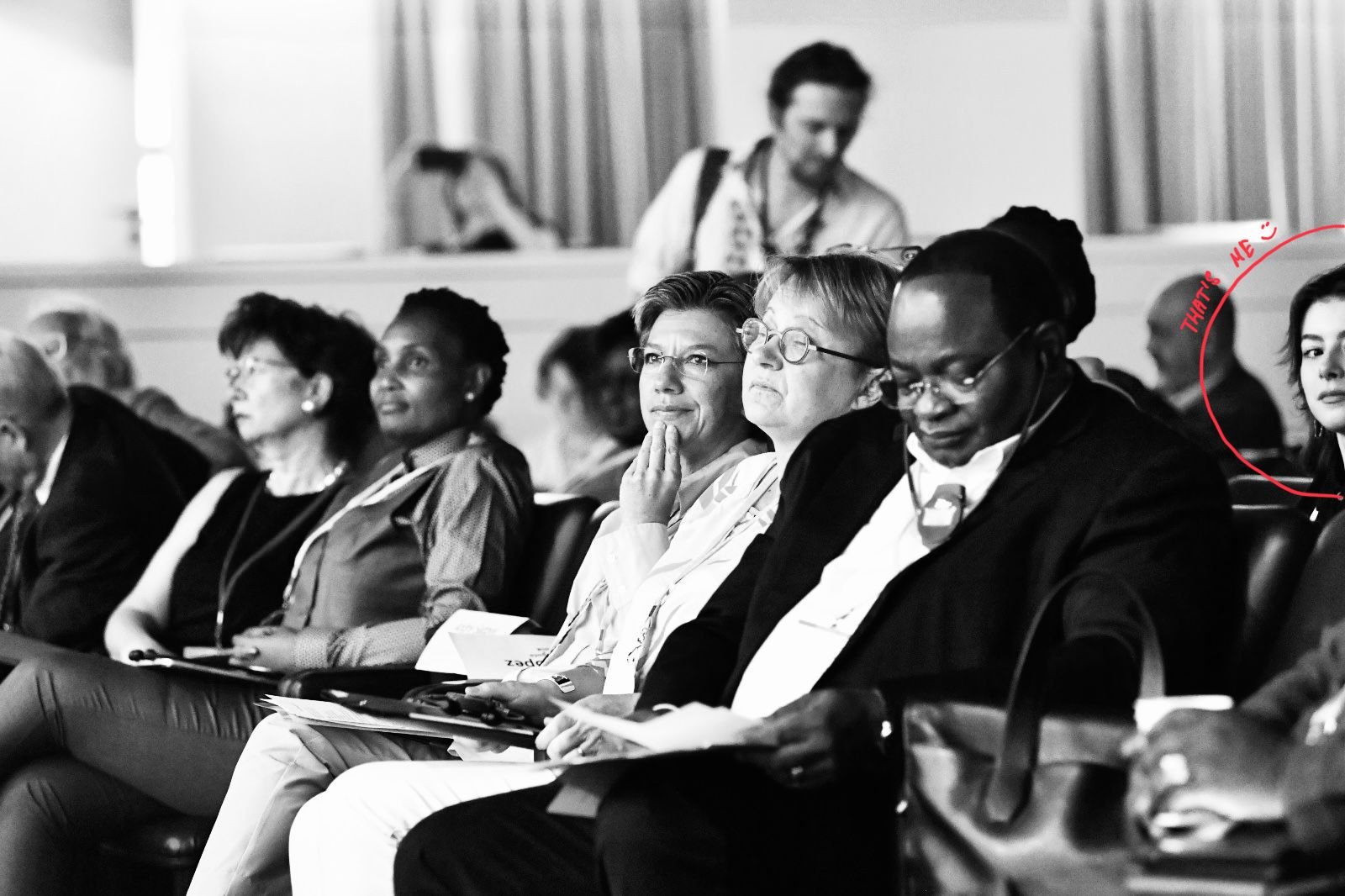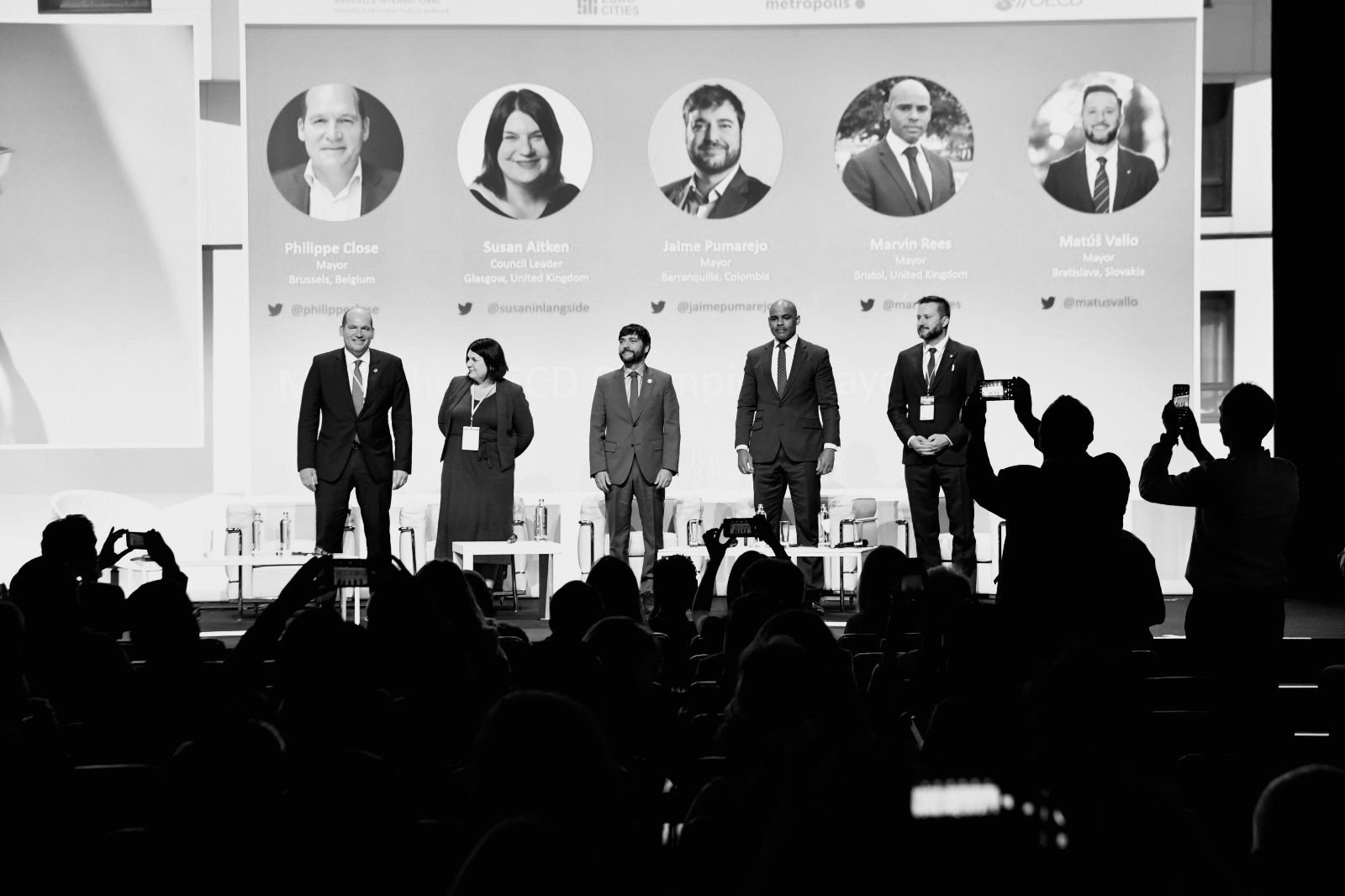Tackling inequalities and rebuilding the social contract in cities
I am finally taking my time to cover the most exciting event of 2023- the Brussels Urban Summit!
God.. I did not think that a lecture or a session could bring me this much joy and fulfillment. There were numerous incredible events, and I got to visit several of those, which I am endlessly grateful for.


The first event that we will discuss in this article is the opening plenary session. It was dedicated to the inequalities and social contract, as stated in the title.
The discussion started with a statistical quiz for the audience, which determined the flow of the session.
What was the biggest shock that accentuated the crisis in your city?
The answers contracted to a small bubble of similar perspectives:
- INFLATION
- HOUSING
- COVID
- WAR
- INFLATION - HOUSING - COVID - WAR
Let us shortly cover these concepts one by one.
The COVID-19 PANDEMIC, which emerged in late 2019, has appeared as an exceptional global crisis that profoundly affected cities from an urban perspective.
--> The pandemic has revealed vulnerabilities in the healthcare systems, leading to the urgent establishment of makeshift medical units within the cities.
--> Mass transit systems, critical for urban mobility, have faced a decrease in ridership due to safety concerns. This forced cities to adapt to changing patterns of urban transportation and evaluate the resilience of their transit systems.
--> The world demonstrated elevated sensations of isolation due to lockdowns. The pandemic emphasized the need for balancing these contrasting dynamics in the urban setting through an introduction of various changes in the environment (more on that in my article: "Prioritizing cyclists and pedestrians").
--> COVID-19 has also underscored the importance of stable and safe housing within cities, revealing vulnerabilities in the housing system.
WAR, throughout history, has brought profound and devastating consequences to its victims all over the world. From a welcoming country perspective (since this short note could never cover all the atrocities of the war faced by those living through it):
--> War forced populations to flee their homes, leading to a surge of internally displaced people (IDPs) and refugees in cities. The rapid influx of people pushed the urban housing market, social services, and resources, creating humanitarian and socio-economic crises within municipalities.
--> Urban communities generally become more polarized during times of war. Ethnic, religious, or political divisions may intensify, leading to social unrest and violence within cities.
The availability, affordability, and quality of HOUSING in urban areas are crucial determinants of a city's overall well-being:
--> In many metropolises, housing costs have skyrocketed, outpacing income growth. A lack of affordable housing placed significant economic pressure on the population.
--> The scarcity of modest accommodation increased the stake of homelessness, pushing vulnerable groups to the margins of urban life. Homelessness not only engenders humanitarian crises but also poses public health hazards and contributes to social fluctuation within cities.
--> The process of gentrification, while often intended to revive urban areas, can lead to the displacement of long-time residents, disrupting social webs and cultural diversity.
--> In densely populated cities, housing shortages often lead to overcrowding. Overcrowded housing conditions lower the quality of life, which affects the physical and mental health of society as a whole.
INFLATION poses unique challenges when viewed from an urban standpoint:
--> Rapid inflation drives up the cost of living in cities. Housing, utilities, and essential goods become more expensive, making urban life less affordable for residents.
--> Inflation often aggravates income inequality in urban areas. As a result, urban disparities broaden, often leading to social tensions.
--> Inflation affects urban mobility, with rising transportation costs, such as fuel and public transit fares.
--> Inflationary pressures can be particularly challenging for small businesses in cities. Rising operational expenses, including rent and utilities, can force small businesses to close. That can lead to many negative consequences, such as diminishing safety levels in the neighborhoods (more on that in my article "Café Chronicles").
There is a rather striking factor that unites all these motivations - the danger-prone association of all members of the societies inhabiting cities.
Hence we get the following question arising:
2. Is inequality undermining trust and cohesion in your city?
That is, based on all of the concerns of our society in 2023, we can conclude that they all have a factor of non-equal rights, coming, respectively, from certain troubles such as inflation, which force society to adapt for survival. Survival mode in itself ultimately forces us to loose some share of the equality level in the community. 92% of people present in the room during the plenary session agreed with this statement. It is a really large ratio, and it is frankly scary. It makes you think once again about how we treat those around us, how we succumb to the system that we create, how we drive ourselves into a framework, and how afraid we are to allow our society as a whole to grow and evolve. And all of that is due to the specific beliefs or certain restrictions that can be avoided or reconsidered.
The core idea transmits that the trust deficit within urban environments and the erosion of social cohesion can be attributed, in significant part, to the failure of policy-makers to fulfill commitments and address urban challenges effectively.
Transparency in policy-making is a cornerstone of rebuilding trust.
Thus, establishing mechanisms for accountability is essential to ensure that promises made are promises kept.
Furthermore, the inclusive and representative nature of urban policies is pivotal to nurturing social cohesion.
Policies that take into account the diverse needs, standpoints, and voices of urban populations are more likely to resonate and connect communities.
3.Which aspect(s) of inclusive growth would you like your Mayor to prioritize?
A pivotal component within the viewpoint of the Mayor of Bratislava, Slovakia pertains to the reconsideration of public space, enclosing the dual dimensions of service provision and the cultivation of democratic ideals wherein urban areas are designed as inclusive environments for all residents. It is noteworthy that the physical design and arrangement of urban spaces can wield a substantive impact on the psychological and social well-being of individuals, influencing their interactions and overall demeanor toward one another. Of particular significance to the Mayor is the emphasis on ensuring that public spaces exhibit a superlative quality, fostering a sense of inclusivity and accessibility and that urban housing options span a broad spectrum, underscoring the inherent value attributed to these facets within the city.
The Mayor of Barranquilla, Colombia articulated the following initiatives that have contributed to a notable reduction in urban inequality in recent years:
Enhancement of Public Spaces: The concerted effort to transform public spaces into vibrant community hubs entails community engagement, wherein urban locales are reimagined as centers for collective activities.
Housing Policies: Integral to this multifaceted approach is the reassessment of public housing policies. A primary goal is to ensure that these policies do not displace residents from their traditional neighborhoods. Instead, they aim to facilitate urban densification, thereby nurturing the growth and consolidation of existing communities.
Climate and Resilience: The dynamic of climate migration, in conjunction with the demand for robust physical infrastructure, emerges as a compelling determinant. A resilience-based approach is adopted to foster a heightened sense of safety and security among urban residents.
The Council leader of Glasgow, UK articulated a strategic imperative centered on the principles of equitable labor practices and workforce development. The components of this strategy encompass fair employment practices, the promotion of career advancement opportunities within various employment sectors, the establishment of mechanisms to amplify the voices of workers within their workplaces, and the facilitation of access to gainful employment opportunities that provide individuals with a dignified standard of living.
Central to this vision is the recognition that fostering equitable employment conditions catalyzes sustainable and enduring economic transformation. By dismantling the perpetuating cycle of poverty and affording individuals the capacity to participate in fair and gainful work over a protracted period, a gradual but profound transformation in their socioeconomic circumstances can be achieved.
Emphasizing the city's diversity, denoted by the existence of 104 languages spoken within Brussels, the Mayor of the Belgian capital underscored the pivotal role of educational endeavors in fostering harmonious coexistence and success within a heterogeneous population. The aphorism "if you build a school, you can close a jail" encapsulated the belief in the transformative power of education, emphasizing that investing in educational infrastructure is an effective means of addressing broader societal challenges.
In retrospect, the Brussels Urban Summit of 2023 stands as a testament to the power of collective dialogue and intellectual exchange.
The opening plenary session, dedicated to the exploration of inequalities and the social contract, served as an illuminating focal point for the summit. The dialogue that unfolded during this session was a microcosm of the larger purpose of the summit – to collectively confront urban crises, foster inclusivity, and drive meaningful change.
I will keep on speaking of this incredible event, and I am happy that we finally got to this discussion.
Stay tuned!

